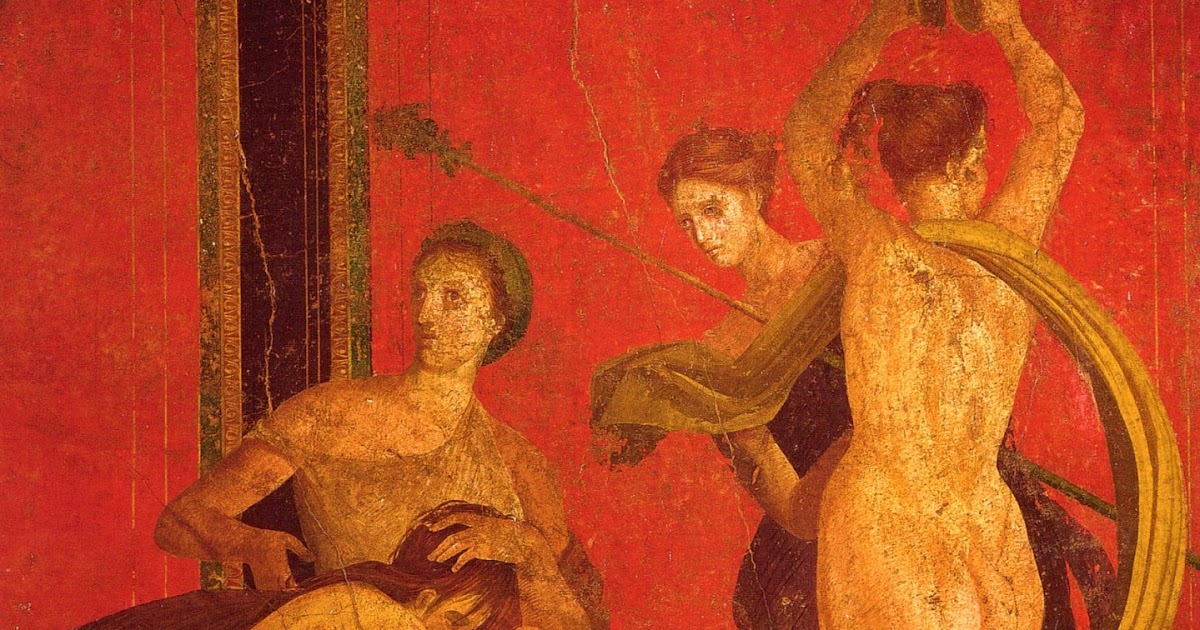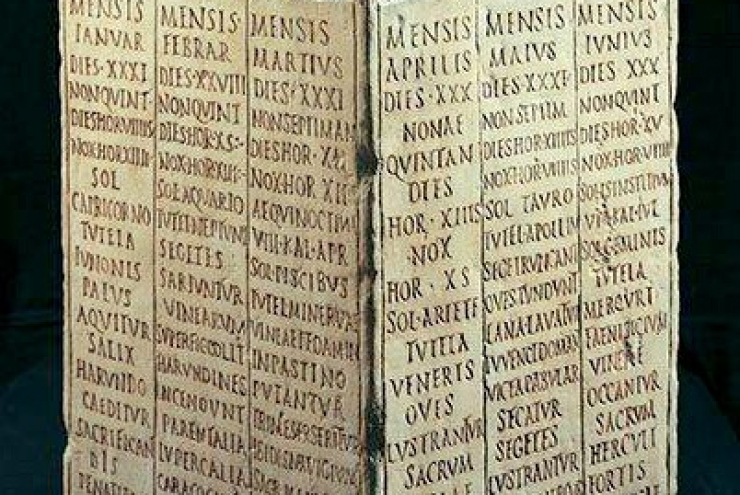Iamblichus’ Theurgy
 According to the Platonic philosophy, the condition for the birth of a person is the encounter of a soul with a body. What is the relationship of the soul with the material world? Does it bind completely to the body after having crossed the seven planetary spheres? Or does a part of the soul remain uncontaminated, up there somewhere, waiting to be remembered by the person who is fighting in the daily life of the sublunar world? It is surprising how the answer to this question can have great implications for our religious practices.
According to the Platonic philosophy, the condition for the birth of a person is the encounter of a soul with a body. What is the relationship of the soul with the material world? Does it bind completely to the body after having crossed the seven planetary spheres? Or does a part of the soul remain uncontaminated, up there somewhere, waiting to be remembered by the person who is fighting in the daily life of the sublunar world? It is surprising how the answer to this question can have great implications for our religious practices.
Plotinus maintained that the purest part of the soul remains in the heavens, detached from the body and from matter, which instead are a burden, an evil for the confusion provoked in the soul through perceptions. This thought, which was probably influenced by Gnostic cosmology, was not orthodox with respect to the Paideia of Plato, who otherwise believed that souls should live in their own place in the cosmos and seek, here and now, through their demons, peace, prosperity, and justice (dialogue “the Laws”) and reconstruct on earth, or in the sensitive world, the golden age (“Republic”). Unlike Plato, Plotinus’s philosophy did not consider the cosmos as a divine revelation. In this perspective, all that is material is devalued, including religious rituals, which are based on the calendar of the seasons of the perceptible world and use objects made of matter. It is no coincidence that Plotinus explained that the sage can reach the ecstatic union with the One without the help of any deity.
The great Porphyry continued, like his teacher Plotinus, to consider the soul not completely incarnate and, in practice, identified with the Nous. However, he probably realized that Plotinus’ route led to the end of religion and tradition, for the benefit of a very small group of philosophers, while the people, deprived of their ancient religious reference points, were exposed to Christian superstition. Porphyry then, following his heart with a great impulse, recovered various aspects of the polytheistic tradition, adding the theurgical practices, amalgamating the contents according to the line of his teacher. At this point, however, there arose a problem of consistency that he could not solve: what was the use of religion and theurgy to a soul never completely incarnated when it could directly access the Nous? Porphyry, as an honest intellectual as he was, posed a series of questions in a real open letter, the “Letter to Anebo“, where he suggested theurgical practice only to those who did not live up to philosophical perfection, stating: “The philosopher is the savior of himself “(De Abstinentia II, 49, 2). The utility of theurgical action was recognized only for non-philosophers with an effect limited to the purification of the lower part of the soul, the incarnated one, sometimes called “pneuma”. From this perspective, Porphyry even criticized the sacrifices of the traditional religion, because they took place through the perceptible world and could attract, with the smell of the victims’ flesh, the evil demons, but certainly not the Gods. Obviously, at a time when the traditional religion was under the constant attack of the Christian media pressure, the questioning of the millennial practices was experienced with great delight precisely by those whom Porphyry was fighting against.
Iamblichus, a Greek-speaking Syrian philosopher, solved the problems presented by Porphyry by replaying anonymously with “The answer of the master Abammon to the Letter of Porphyry to Anebo“. This letter historically deviated the course of Neoplatonism for centuries to follow. In the Renaissance, Marsilio Ficino translated it from the Greek into Latin with the title “De Mysteriis Aegyptiorium, Chaldaeorum, Assyriorum”, otherwise known simply as “De Mysteriis“.
The premise from which the whole doctrine of Iamblichus develops is the complete embodiment of the soul in the material world. Moreover, retrieving Pythagoras’ theories and the materiality of Egyptian rituals, which are based on natural cycles, he clarifies that matter is not evil but is part of the divine plan, thus contradicting Numenius, Plotinus, and Porphyry. The perceptible world is the last frontier of the Demiurge: the paradoxical incarnation of an immortal soul in a mortal body offers the opportunity to continue the creative work on the material level and to carry out a soteriological function in the material world according to a divine plan.
In other words, what we do under heaven also has spiritual value. This is the cornerstone of the exercise of Virtus in the social context, of Religio in the exoteric context and of the theurgical practices in the esoteric context. In fact, if we deny the possibility of any effect of the material world on the psychic sphere, we get two possible alternatives: the first on the basis that one can not induce good from matter to the psyche involves withdrawal from the material world in favor of asceticism, approach followed by Plotinus and, only partially, by Porphyry. The second, logically symmetrical, on the basis that one can not induce evil from matter to the psyche is libertinism.
Iamblichus states that our action theater is the material world. If we believe that we are able to ascend without reckoning with our materiality, we live in delusion. Since the soul is completely incarnated, she can not return to the One without the help of the deities. The great lesson, in line with the Roman tradition, is that spirituality takes place gradually, starting from demons (geniuses, lari, numina). According to the ancient mentality, the religious ritual can only take place with orthopraxis, the correct formal execution, using the objects, the offers and the pertinent formulas (synthemata) as a means to approach the divine, in order to awaken that affinity (philia ) which will allow the officiant access to the energy of the deity. Through the rituals and with the help of demons, the officiant moves gradually from the material to the divine plane.
The cult of the cosmic or worldly Gods, manifested for instance through the planets, takes place according to the laws of fate and its main expression: the calendar. Since the cosmic Gods are revealed by the demons, the latter must be involved in material rites. A fundamental psychological aspect is that demons are also the forces responsible for passions and carnal instincts, which are tempered and stabilized through rituals. Without this characterization, the soul of the theurgist can not ascend. Iamblichus exemplified the situation of Porphyry, who on one hand claimed to have lived the ecstatic union with the One, on the other, he suffered from depressive crises that drove him to suicide. This made it impossible to believe his henosis.
Iamblichus wrote that in order to ascend to the Demiurge and the One, it was necessary to honor all the Gods to regain inner peace. Iamblichus, who lived in the eclectic context of the Hellenistic period, did not follow the Roman Religio but honored the Hellenic and Egyptian pantheon, however according to his writings he had a traditional approach based on existing rituals, according to his citation of the “materiality of Egyptians rituals” and the use of the original language formulas. Thus, to Iamblichus, religion is consistent with the first level of theurgical work. Actually, it is the necessary condition for making esoteric action effective. In other words, religious orthopraxis along with virtuous behavior is consistent with the first degree of theurgy. This reading is consistent with a Roman tradition that sought Pax Deorum through traditional practice.
According to Iamblichus, a harmonized soul can reach higher levels of realization with theurgy. Above the tripartite soul functionally in thymos, epithymia and logismos, there is “to hen tēs psychēs”, the one of the soul, its unitary principle. When “to hen tēs psychēs” joins the hypercosmic or ultramundane Gods, following their own essential nature, the soul is liberated from fate. The hypercosmic Gods, however, do not act in our cosmos, so the following question arises: how can the soul rise up to them? The theurgist, using sacred material objects, symbols or synthemata of traditional religion, moves demons into the material world to rise to the cosmic Gods. Although the order of these is clearly separated from that of the hypercosmic Gods, there is an intermediate divine order that partially overlaps between the two, that of the Liberated or Liberating Gods (apolutoi), under the reign of Saturn, the Liberated Demiurge, who reigned on the cosmos in the gold age with a noetic providence. The Liberated Gods have a dual nature, which allows them to be present simultaneously in the cosmic order (at the top of it) and at the base of the hypercosmic order. Through the theurgy therefore the souls can aspire to the Liberated Gods to benefit from the liberating action and thus break the chains of fate.
It is therefore essential to recognize the function of demons as a first step. Iamblichus recognizes three types: those that help the Gods to repay the theurge of his efforts, those who administer justice by rewarding the virtuous and punishing the wicked, those who have neither logic nor judgment and who are in charge of certain powers at the head of natural functions. The true mission of souls is to use demons by imitating the Demiurge, ie acting righteously according to the laws of the Gods that shape the world. These laws are as biological as they are ethical, so that the effort of the incarnated soul includes eating well, exercise, the correct cycle of sleep and wakefulness, but also the right behavior towards other human beings and towards the Gods through the Religio. All this is exemplified by the figure of Pythagoras in the book of Iamblichus: “De Vita Pythagorica”.
Esotericism without a solid traditional religious basis does not belong to the thought of Iamblichus. Now as it was then, performing an esoteric work without daily exercising the Pietas and the Virtus, or in other words without inner balance, besides being nefas, is illusory. Iamblichus offers a solution that is not limited to the great ascetic minds that can afford to live isolated from the world. The exercise of Virtus and the celebration of rituals are available to the Roman people. It is up to us to respond to this opportunity and to seek out the divine philia with the Pax Deorum, for the manifestation of the demiurgic work in history.
Fori Hadriani scripsit, Non Ian MMDCCLXXI
Mario Basile
References: Shaw, Gregory. Theurgy and the Soul: The Neoplatonism of Iamblichus. Angelico Press/Sophia Perennis.
















